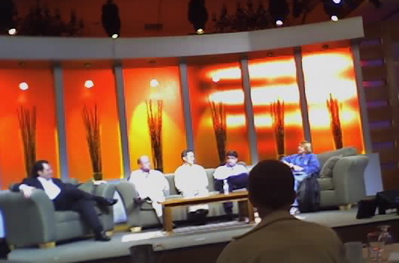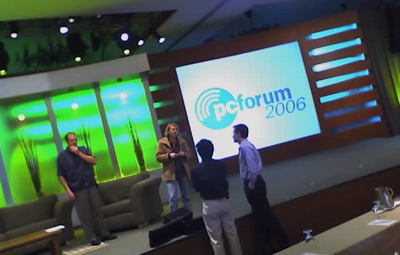A great mix of panelists for this one: Marc Benioff of Salesforce.com, Jeremy Allaire of Brightcove, Leonard Liu of Augmentum, and Eric Rudder of Microsoft. Did Benioff face resistance to his business model? Yes, the enterprise market has a lot of resistance to change, he said. But finding the right app (not just a platform) was the key for Salesforce.com. “Build it, let people use it, then pop the top and let them build on it. Our AppExchange service now has 200 apps, and we’re adding 5 to 10 more per week.” Jeremy Allaire’s startup is based on “a direct model for multimedia content.” (Note he didn’t just say video.) “The distribution models of old are quickly eroding.” he said. “We’re actually allowing  individual websites to do global broadcasting.” What’s interesting now, Jeremy said, is that his firm is encountering an incredible willingness to experiment” (presumably by the traditional video distribution businesses, and by video producers). Why? “Out of fear, to pursue new revenue opportunities, just to stay out in front.” Esther asks what friction he’s seeing…. “It’s similar to the early days of e-commerce,” he said, “where manufacturers worried about going direct, then ended up discovering that blended distribution worked best. It’s the same now.” When asked what challenges he sees, Leonard Liu of Augmentum, whose firm is providing software development services for U.S. firms via a staff of 450 in China, says the challenges are many, including language. “But China is the next big player” in this space, he said. “We’ve seen in India what can happen. But it takes a true understanding of China — for example, the young people are different than the old — as far as how the cultures work together.” Liu said 60% of what his firm does is total product development, “from beginning to end.” Intel is one big customer. And how does Microsoft react, now that it isn’t such a target, Esther asked of the fourth panelist. “How can we marry all this friction-free software to the Windows environment,” was his obvious first answer. “But we see many opportunities — advertising, subscription models, Office Live. This is an exciting time, now that we’re unleashed to an extent. We think we’re responding well to what people want and don’t want.”
individual websites to do global broadcasting.” What’s interesting now, Jeremy said, is that his firm is encountering an incredible willingness to experiment” (presumably by the traditional video distribution businesses, and by video producers). Why? “Out of fear, to pursue new revenue opportunities, just to stay out in front.” Esther asks what friction he’s seeing…. “It’s similar to the early days of e-commerce,” he said, “where manufacturers worried about going direct, then ended up discovering that blended distribution worked best. It’s the same now.” When asked what challenges he sees, Leonard Liu of Augmentum, whose firm is providing software development services for U.S. firms via a staff of 450 in China, says the challenges are many, including language. “But China is the next big player” in this space, he said. “We’ve seen in India what can happen. But it takes a true understanding of China — for example, the young people are different than the old — as far as how the cultures work together.” Liu said 60% of what his firm does is total product development, “from beginning to end.” Intel is one big customer. And how does Microsoft react, now that it isn’t such a target, Esther asked of the fourth panelist. “How can we marry all this friction-free software to the Windows environment,” was his obvious first answer. “But we see many opportunities — advertising, subscription models, Office Live. This is an exciting time, now that we’re unleashed to an extent. We think we’re responding well to what people want and don’t want.”
Tag: PC Forum 2006 (Page 2 of 4)
Tuesday’s first panel looked at what individuals can do about online security versus government. Didn’t really get an answer to that, except for a rambling question (comment?) from the audience at the end, by David Kirkpatrick of Fortune, which began with him saying, “If consumers are in charge of security, we’re in big trouble.” A few comments earlier by panelist Stratton Sclavos of Verisign were interesting, however. “Our biggest worry is, in the race, can we stay ahead? The cleverness continues.” He also said, shockingly, that security issues on the ‘Net are getting to the point that Versign has “to overprovision our infrastructure by 150 times” to defend against it. Moderator Esther Dyson asked, “Did you say 150x, not 150%?” (The answer was yes, 150x.) “And it’s a big, big burden.” Want another shocking stat? “Our .com registrations have soared recently from 4 or 5 thousand a week to 7 million a week,” Sclavos said — just from all the interest in “monetizing search traffic.” The question then became, how many of these are legitimate vs. potential security problems. Sclavos basically returned the question, asking “What is ‘legitimate’ use? How do we decide?”
Behavorial targeting 1.0 got a bad name, and for good reason. Collecting consumer information without permission was a sure-fire way to get flamed and trashed. It’s not that the hearts of these vendors weren’t in the right place — after all, we’d all prefer more targeted, relevant ads. But, lo and behold, as online advertising has taken off on such a rocket growth trajectory over recent years, a lot has been evolving behind the scenes in this space — including even by some of the original transgressors. I’ve been impressed by what Esther Dyson and her organization bring to helping us understand this  changing world of advertising. Four of their hand.pngcked participants for this morning’s “Behavioral Targeting 2.0” panel gave us a great overview and quick education on the topic. Don McLagan of Compete told us his company has been doing permission-based behavioral targeting for more than 4 years, and now has 50 terabytes of data under its care. He says his firm is “the eyes and ears of what consumers are doing and saying online.” How permission-based is his service? He says it’s actually not a dual, but a tri opt-in system. Arvind Rajan of Grassroots said his firm began life as an ASP for political organizations but now has corporate clients, due to its understanding of the individual activist. Release 1.0 said in its current issue that it “is perhaps the most effective, most one-to-one marketer” here. Dean Thompson of mSpoke offers a service for online publishers based on what it calls its “adaptive personalization engine,” which lets users manage their own content and ad preferences. These preferences are represented in something the user can see and edit, which it calls “memes.” Dave Morgan of Tacoda also is pushing the notion of showing consumers their own information, and letting them change it. They don’t have a direct relationship with the consumer, but implement their service through publishers. Morgan was quick to remind is that “advertising pays for 99% of what’s on the web.” The newspaper industry, in which he once worked, “is dying because it thought it could sell online subscriptions.” But there’s a lot of room for more growth in online advertising, since he said “40 percent of online search results pages still have no ads on them.” And yet 90 percent of online ad revenues go to just those search engines: Google, Yahoo, MSN, and AOL.
changing world of advertising. Four of their hand.pngcked participants for this morning’s “Behavioral Targeting 2.0” panel gave us a great overview and quick education on the topic. Don McLagan of Compete told us his company has been doing permission-based behavioral targeting for more than 4 years, and now has 50 terabytes of data under its care. He says his firm is “the eyes and ears of what consumers are doing and saying online.” How permission-based is his service? He says it’s actually not a dual, but a tri opt-in system. Arvind Rajan of Grassroots said his firm began life as an ASP for political organizations but now has corporate clients, due to its understanding of the individual activist. Release 1.0 said in its current issue that it “is perhaps the most effective, most one-to-one marketer” here. Dean Thompson of mSpoke offers a service for online publishers based on what it calls its “adaptive personalization engine,” which lets users manage their own content and ad preferences. These preferences are represented in something the user can see and edit, which it calls “memes.” Dave Morgan of Tacoda also is pushing the notion of showing consumers their own information, and letting them change it. They don’t have a direct relationship with the consumer, but implement their service through publishers. Morgan was quick to remind is that “advertising pays for 99% of what’s on the web.” The newspaper industry, in which he once worked, “is dying because it thought it could sell online subscriptions.” But there’s a lot of room for more growth in online advertising, since he said “40 percent of online search results pages still have no ads on them.” And yet 90 percent of online ad revenues go to just those search engines: Google, Yahoo, MSN, and AOL.
After the session, at lunch, I ran into the CEO of another “behavioral 2.0” company — Bill Day of When U (formerly head of About.com) — and I asked him for his reaction to the panel. Esther Dyson had even mentioned near the end of the panel that Bill could have been up on stage himself. He said the 2.0 version of behavorial targeting is definitely characterized as being more consumer centric. He said there are three things central to this new generation of the technology: the privacy model (from a technical standpoint), disclosure, and user value — meaning what consumers get in return. In the 1.0 version, he said the latter “was basically nothing.” Regarding his firm’s privacy model, he said they save no data — it’s all on the consumer’s local machine — and they disclose everything. The user value WhenU provides is all about relevancy. His customers include car companies, ABC-TV, LowerMyBills.com, Travelocity, Orbitz, and the firm has a partnership with Overture (Yahoo). “Eighty-five percent of the web is ripe for a new kind of advertising,” he said. “There are large opportunities.” His firm’s model is direct to the consumer, and there aren’t many in this space, he noted. “And ours is the most realtime solution, too” which is critical, he says, because the life of behavioral data is very short — maybe 24 hours. “So advertisers need us to provide the ability to suggest ‘at the moment’.”
The two-minute pitches from the startups that will present this afternoon were great. Lots of enthusiasm and great business concepts. Hard to pick a favorite, but I like the sound of Illumio a lot — a project of Tacit Software, just coming out of stealth here today. “It lets users search each other, search your networks, for what these people know, what they have, and who they know,” said David Gilmour, CEO. He also told me yesterday afternoon that the public beta kicks off with us here. The product will be free initially. He said Illumio is “a Web 2.0 way” to extend his company’s proven collaboration software for large organizations. The CEOs of the five Gallery company (exhibitors) also made me want to get over and spend time with them as well, esp imeem and Bity Browser. Already saw Riya at Demo, and they’ll be a hit here, too, I’m sure.
The first two sessions here on Monday morning, says Esther Dyson, are “question panels,” not answers panels. Read: big, big topics. In the first panel, three startups — Opinity, Root Markets, and Trusted ID — talked about how they can help users actually control their own data, taking that power from the  institutions that now have it. But a big takeaway is that all this won’t happen soon. Scott Mitic of TrustedID says he’s personally heard people at these big institutions say that “will happen over my dead body.” But, he says, “the system is broken…when three credit bureaus are selling your info for fraudulent proposes, even though they don’t mean to…and when it’s costing consumers tens of billions of dollars a year… someone must stand up for the consumer.” Opinity will have you pay (indirectly) for a profile it manages, while Root Markets will actually pay you for your data.
institutions that now have it. But a big takeaway is that all this won’t happen soon. Scott Mitic of TrustedID says he’s personally heard people at these big institutions say that “will happen over my dead body.” But, he says, “the system is broken…when three credit bureaus are selling your info for fraudulent proposes, even though they don’t mean to…and when it’s costing consumers tens of billions of dollars a year… someone must stand up for the consumer.” Opinity will have you pay (indirectly) for a profile it manages, while Root Markets will actually pay you for your data.

Recent Comments